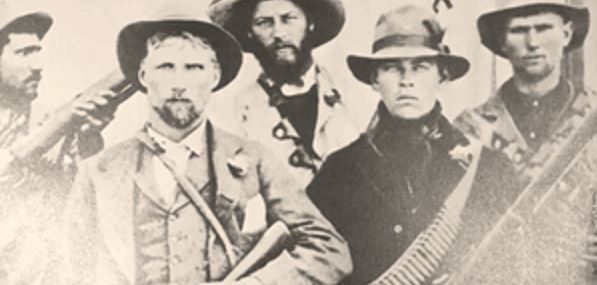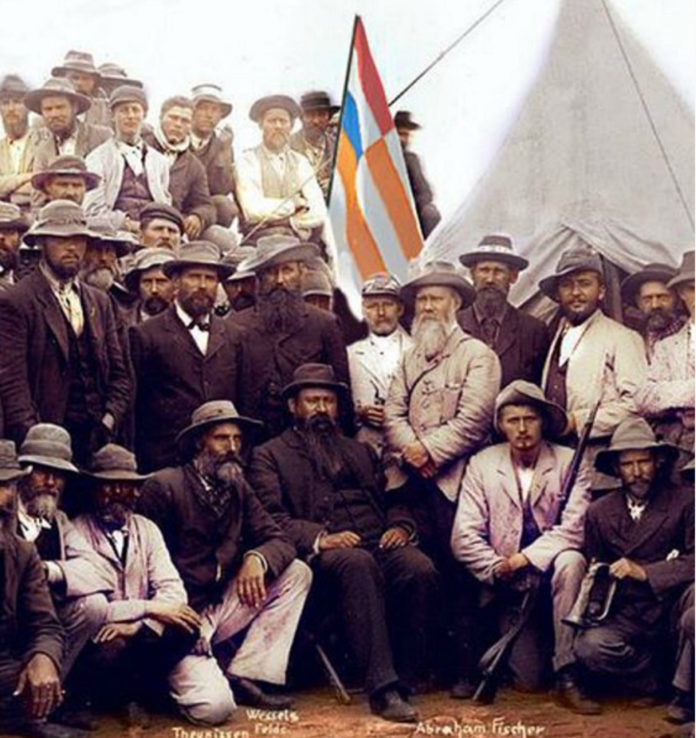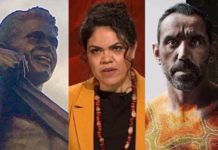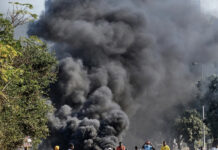From Patriotic Alternative.
By Bill Atheling
The first of my wife’s ancestors to arrive in the Cape of Good Hope were Dutch Calvinist settlers who came ashore at Table Bay on the 6th of April 1652. The colony grew and prospered but its strategic position as a settlement on the Cape of Good Hope did not go unnoticed. By the 1830s some of the descendants of those Dutch settlers (who came to be termed ‘Boer’ or farmer) trekked into the largely deserted interior, rejecting the imposition of British imperial ambitions in the Cape.
They went armed with muskets and carried their entire lives in their ox drawn, covered wagons. As the current South African government talks about ‘planned expropriation’ of white-owned land, it is important to reflect that these early settlers did not ‘steal’ the land or ‘grab’ the land from any tribes. They were simply small groups of frontiersmen and women, hoping to establish farmsteads far from the reaching hands of empire and live in peace with their families and their God. The landscapes they traversed were largely uninhabited or simultaneously being invaded by Bantu tribes sweeping in from the north. When challenged, the Boers held their own against overwhelming odds and vowed to their stern God that every victory would be remembered as a divine blessing and honoured accordingly in their calendars. After the discovery of diamonds and then gold in the Boer republics, the British inevitably expanded into the interior. Invaded and outnumbered, the Boers nevertheless fought like lions. For two and a half years these farmers lived in the saddle, spurred on by their fiery patriotism and righteous indignation. They would attack at night without warning, then, just as rapidly, vanish like phantoms into the dusk.
The creator of Sherlock Holmes, Sir Arthur Conan Doyle, worked as a doctor in a Bloemfontein military hospital during the Anglo-Boer war. During his time in South Africa, Doyle came to admire these Boer opponents, writing:
“…one of the most rugged, virile, unconquerable races ever seen upon earth. Take this formidable people and train them for seven generations in constant warfare against savage men and ferocious beasts, in circumstances under which no weakling could survive, place them so that they acquire exceptional skill with weapons and in horsemanship, give them a country which is eminently suited to the tactics of the huntsman, the marksman, and the rider. Then, finally, put a finer temper upon their military qualities by a dour fatalistic Old Testament religion and an ardent and consuming patriotism. Combine all these qualities and all these impulses in one individual, and you have the modern Boer — the most formidable antagonist who ever crossed the path of Imperial Britain.”
 The British only finally broke the Boer resistance by burning down the Boer farms and imprisoning their women and children in specially constructed concentration camps. Forced into overcrowded and unsanitary conditions, more than 25,000 internees perished (mostly children). They died due to disease, malnutrition and, in some cases, plain cruelty. The embittered Boers could see that it was all over, and so the war ended. They returned to the smoking ruins of their farms and rebuilt. Indeed, they prospered once more and the sons and daughters of those early Dutch and English settlers grew together as the white South African nation. But the seeds of their future destruction had already been sown.
The British only finally broke the Boer resistance by burning down the Boer farms and imprisoning their women and children in specially constructed concentration camps. Forced into overcrowded and unsanitary conditions, more than 25,000 internees perished (mostly children). They died due to disease, malnutrition and, in some cases, plain cruelty. The embittered Boers could see that it was all over, and so the war ended. They returned to the smoking ruins of their farms and rebuilt. Indeed, they prospered once more and the sons and daughters of those early Dutch and English settlers grew together as the white South African nation. But the seeds of their future destruction had already been sown.
Communist Take Over
I left South Africa to return to the UK with my young family in 1994. At that time, I had been married for almost three years and our first child was still very young. This decision to leave everything and to start a new life with literally only the suitcases we carried was a difficult one to be sure, not least for my wife who had to abandon that country her forefathers had been taming and tilling for over 300 years. Yet, despite assurances about the protection of minority rights in the new political dispensation, the writing was clearly already on the wall. The African National Congress (ANC) inevitably came to power and former ANC guerrilla and senior member of the South African Communist Party, Nelson Mandela, was now the president.
We were told that things in the new ‘Rainbow Nation’ would be better than they had ever been. Many of the people I knew even looked forward optimistically to a prosperous ‘shared’ future. But even though I was a relatively naïve young man, I was aware that the results of decolonisation in other African states had been unequivocally disastrous, and I already had a pretty good idea of what might lie ahead for South Africa. Besides, the signs were clear. The road to the election had been soaked with the blood of thousands. South Africa had a long history of violence between its competing black tribal groups but now the internecine fighting was worse than ever before. Ironically it was the Apartheid regime that had managed to contain that violence and enforce the Pax Africana. With the iron hand of the state becoming increasingly impotent, it seemed to me only a matter of time before the ‘in group preference’ of the new regime would ensure that whites as a minority would not, could not, prosper there. Violence and the threat of it, began to reach into everyone’s lives and few, if any, remained unaffected. Then, a personal encounter with ‘Affirmative Action’ in the workplace, was simply the proverbial ‘last straw’. Like many former ‘normies’, these stark experiences added to the long process of my own awakening – living in Africa itself for 12 years had been my first ‘red pill’. I certainly still had doubts at the time (and later regrets) about leaving South Africa, but the societal collapse of the country over the past two decades has exceeded even my most dystopian imaginings.
Now, more than a quarter of a century after the ANC took power in South Africa, the political decision (and it will be disastrous) to expropriate the land of white farmers is coupled with an undeclared war and literal genocide against white South Africans and farmers in particular (and that is according to the UN definition of the word genocide). The continued silence of the ‘mainstream’ media on this subject tells a tale all of its own.
The continued existence of white South Africans within their own homeland is at best, uncertain. But that word is key. It is their homeland. It is the space that they carved out of the wilderness. Theirs was a hard-won frontier. The red earth of Southern Africa is coloured with their blood, their sweat and their tears. None have a higher claim to that soil than the Boer nation who, against all adversity, established a thriving and prosperous European civilisation across the southern portion of the dark continent. But that means nothing unless you can hold, defend and protect that home for posterity. If nothing else, the rise and fall of white South Africa, should be a warning to us all in the west.










